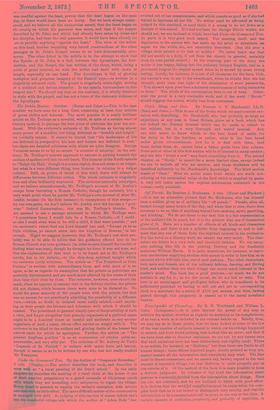The Dublin Review. October. (Barns and Oates.)—This is the beat
number we have seen for a long time, containing at least four articles of great ability and interest. The most popular is a really brilliant article on Mr. Trollope as a novelist, which, in spite of a certain want of literary method, is perhaps the best piece of criticism the year has pro- duced. With the reviewer's estimate of Mr. Trollops as having almost every power of a novelist, but being deficient in "breadth and height," we cordially concur. It cannot be denied that "his landscapes of life are deficient in perspective, his men and women are deficient in soul," but there are detailed criticisms with which we quite disagree. George Tavasour seems to us by no means "a monster of iniquity," on the con- trary, Mr. Trollope's nearest approach to success in getting beneath the surface of modern evil into its evil heart. The humour of the Neefit episode in "Ralph the Heir," though in a coarse region, does not seem to us vulgar, but what is a very different thing, true humour in relation to a vulgar subject. Still, on points of detail of this kind, there will always be differences between different critics. The whole estimate is singularly true and often brilliantly expressed. The reviewer naturally misjudges, and we believe misunderstands, Mr. Trollope's account of Mr. Arabia's escape from becoming a Roman Catholic, though he certainly hits a very weak point when he quotes Mr. Trollope's own account of what Mr. Arabin became (in the first instance) in consequence of that escape ;— for our own parts, we don't believe Mr. Arabin ever did become a " port- wine " Oxford Conservative ; that was Mr. Trollope's blander. We are amused to see a passage extracted in which Mr. Trollope says, -"I sometimes fancy I would fain be a Roman Catholic,—ifl could ; as also I could often wish to be still a child, if that were possible ;" and the reviewer's retort that our Lord himself has said, "Except ye be as little children, ye cannot enter into the kingdom of Heaven," is fair enough. Might we suggest, however, that Mr. Trollope's real wish pro- bably was to be able to believe that the guidance offered him in the Roman Church was true guidance (in order to save himself the trouble of finding what was true), though he thought he knew it was not true, and that the explanation of that wish is to be found not in Mr. Trollope's merits, but in his defects,—in the akin-deep spiritual insight which the reviewer justly criticises. The article on "The Priesthood in Irish Politics" is written with extraordinary force, and with most of it we agree, so far as regards its assumption that the priests as politicians are perfectly disinterested, and are much more affected by the views of their class than their class by them. The reviewer, however, over-shoots his mark, when he appears to assume that in the Galway election the priests did not dictate, solely because there were none to be dictated to. No doubt the great majority of the people were with the priests, but that was no excuse for not practically admitting the possibility of a different view,—which no doubt in isolated cases really existed,—and enjoin- ing on their people the fairness and tolerance with which it should be treated. The priesthood in general simply ignored the possibility of such a view, and forgot altogether that priestly organisers of a political cause ought to be a hundred times as careful and moderate as any secular organisers of such a cause, whose office carries no weight with it. The reviewer is too blind to the evident and glaring faults of the honest but narrow caste for which he apologises. Farther, the article on "The present Anglican position" is as an argumentum ad scholam quite un- answerable, and very ably put. The criticism of Mr. Aubrey de Vere's "Legends of St. Patrick" is written with much force and beauty, though it seems to us to be written by one who has not really studied Mr. Tennyson.


































 Previous page
Previous page